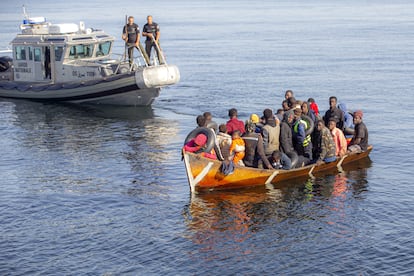Trapped in Tunisia: The deadly coast of clandestine immigration to Europe
The number of migrants from sub-Saharan Africa and Tunisia has skyrocketed in the first four months of 2023. Between January and April, 498 individuals disappeared in shipwrecks while en route to Italy

They try to walk like shadows, trying to be invisible, through a street market in Sfax, the commercial capital of Tunisia.
Ibrahim Galisa, 33, and his cousins – 25-year-old Mamadu and 23-year-old Mayette – are from Guinea. They’ve already tried to flee by boat from this Tunisian port city, which has become an open-air prison for more than 10,000 people hailing from sub-Saharan Africa. These individuals are trapped on their clandestine immigration route to Europe.
Mayette was a pastry chef in the Guinean capital of Conakry. “I’m not afraid to embark again for Lampedusa (the southernmost island of Italy)... here, we’re already dead in life,” he sighs resignedly. He has found himself adrift in Sfax – located about 170 miles south of Tunis – for the past six months.
Ibrahim – leader of the family group – has already gone out to sea twice over the last year-and-a-half. “For less than 2,000 euros, you can’t find someone to take you, even if I [offer to] build the boat with metal,” the mechanic-welder laments. Mamadu – an electrician – nods beside his cousin, as he watches a police vehicle pass by in the distance. He’s been in the Arab country for nearly a year. “We have to leave no matter what – there’s no future in Guinea and neither is there in Tunisia,” he affirms. He is one of hundreds of Black Africans who wander around, trying to go unnoticed in a society that openly rejects them.
There are 21,000 sub-Saharan people officially registered in the country. But there could be up to 40,000, according to NGOs such as the Tunisian Forum for Economic and Social Rights (FTDES). Its director – Alaa Talbi – summed up the situation at his organization’s office, located on the central Bourguiba avenue in the capital: “Thousands of human beings are desperately struggling to escape the hell of Tunisia… [their only options] are to return to their countries of origin or risk dying at sea.” They can also end up dying in Sfax. Last Tuesday, while the three Guinean cousins recounted their story to EL PAÍS, an immigrant from Benin died in hospital. He was in his thirties – he had been stabbed by seven Tunisians.
“Speech inciting hatred of migrants is amplified on social media,” warn the Tunisian associations involved in helping sub-Saharan Africans. “There is a before and after on February 21 of this year, when Tunisian President Kais Said delivered a xenophobic speech,” says Himma Hamad, head of immigration at the Sfax branch of the Tunisian League for Human Rights. Said – who now governs by decree after dissolving the parliament two years ago – described the presence of tens of thousands of Black Africans among 11 million inhabitants as a “demographic threat to Tunisia’s Arab identity.”
The smallest country in the Maghreb region of North Africa, Tunisia is now the main escape route for African migration. The 60 miles of coastline between Sfax and Mahdia (to the north) – where almost 75% of boat departures are concentrated – have become a death coast for clandestine immigration to Europe. Between the months of January and April of this year, 498 deaths or disappearances have been recorded in boat wrecks in Tunisian waters. Around 56% of the total occurred in the Mediterranean, despite the notable increase in naval surveillance, according to FTDES data. According to Talbi, most of the fatalities occurred during the month of April, with 371 people dead or missing, after the “escape order” was issued by the Tunisian president.
“We limited ourselves to labelling the corpses in the morgue with numbers. At the beginning, between April and May, we were overwhelmed,” admits Hakim Annas. Dressed in his vest, he is the director of the Tunisian Red Crescent in Sfax, assisted by only two volunteers. He uses a mobile application in coordination with the International Committee of the Red Cross to locate the relatives of shipwreck victims. “If they’re not identified? A crisis committee from the administration deals with that,” Annas replies. “The municipality has just expanded the cemeteries… now, there are enough graves. Many more are needed compared to last year.”
The pressure of Tunisian emigrants – one-fifth of the total – and especially that of sub-Saharan Africans translates into nearly 19,000 interceptions in the first four months of 2023. This already represents 82% of all those that took place in 2022. Most people are en route to Italy, where 2,935 irregular migrants from Tunisia have arrived in the same period. “And this summer, the worst is yet to come, when the departures multiply,” Talbi warns. “The Tunisians escape in traditional wooden boats – which are safer – but the sub-Saharans only have inflatable boats or unstable metal canoes that they make on the beach,” the NGO director explains.
The guardian of immigration in the Mediterranean
“In exchange for acting as a guardian of immigration in the Mediterranean – with measures based only on security – [Tunisian President] Said receives economic and political support from France and, especially, from Italy,” Talbi notes. “This support has accelerated since the self-coup in July 2021 and with the serious economic crisis in the country… there’s fear that instability could cause a dramatic avalanche of small boats from Tunisia. But the migratory pressure cannot be completely contained,” he concludes.
Located half-a-day away from Tunisia by motorized sailboat, the Italian island of Lampedusa is the gateway to Europe, after Libya sealed its coast in 2017. Ayman Said, 30, of Tunisia, sells tripe lamb and some minced veal at the butcher shop he rents on the outskirts of Sfax. Three years ago, he tried to look for a better future on the other side of the sea, but the Italian security forces captured him when he could already see the coast of Lampedusa. His small boat capsized and he had to be picked up by a rescue boat.
“In just 48 hours, they returned us to Tunisia, after we went through a detention center in Palermo,” he recounts, working at the butcher’s counter. “We were a dozen. We all got on a military plane – except for a minor, who remained in Sicily. They caught us because we ran out of fuel.”
Irregular migrant arrivals through the central Mediterranean are on track to reach record levels this year. Hans Leijtens – the director of the European Border and Coast Guard Agency – has warned about this in statements to Reuters and France Presse. “This hasn’t been seen before and it’s not in response to a specific event,” he emphasizes. Followed by Guineans, Egyptians and Bangladeshis, Tunisians – who represent one of every five migrants who are intercepted – constitute the largest nationality on this exodus route to Europe. “I got married six months ago. As soon as I collect the more than 3,000 dinars they ask for (about $1,000) to cross the sea in a minimally safe boat with a sailor, I will go with my wife to Europe,” says the butcher Ayman Said, full of conviction. “We are more afraid of staying in a country without a future.”
Couples, families with young children, professionals and university graduates are all leaving from Tunisia to Europe. The profile of the Tunisian who gets on a boat headed for the EU – or takes a flight through Turkey or Serbia and crosses the border, in exchange for paying 10,000 euros to an organized group – is no longer solely that of an unemployed urban youth or a peasant living in miserable conditions. This has been confirmed by the humanitarian associations that closely follow the migratory phenomenon in Sfax. “We cannot remain indifferent,” says attorney Zakia Ben Jedir, 31, whose youth organization receives financial support from major Scandinavian NGOs. “Worst of all is the backdrop of racism that has emerged in the city against foreigners, against Libyans and Syrians, but above all, against sub-Saharan Africans,” she laments.
Barricaded at home by sunset
“At seven in the evening, when night falls, my brother and I barricade ourselves in the apartment,” reveals Mohamed Comora, a 33-year-old teacher from Guinea. He claims to have his papers in order, after having arrived from Conakry on a flight to Tunis with a stopover in Casablanca, Morocco. However, he acknowledges that his tourist visa has already expired after a three-month stay. “What I have seen in Sfax against the Blacks is terrible. It’s an ignored reality. Several Tunisians robbed me with scissors and then they hit me on the head,” he recounts, while sitting at the most hidden table in a cafe. During his conversation with EL PAÍS, he doesn’t dare ask the waiters for even a glass of water, for fear that they will refuse to serve him.
The Sfax branch of the Tunisian League for Human Rights has collected more than 60 complaints of attacks on sub-Saharan migrants following the president’s speech three months ago. “There must be many more unreported cases,” says Hamad, head of immigration at the association. He lists the things that sub-Saharan Africans are subjected to: “harassment, being kicked out of their job, being expelled from their dwellings…” According to Hamad, these individuals are suffering the consequences of the wave of xenophobia that was unleashed by Said’s words. “Sfax is a prison for them: they are exploited with wages of 30 dinars – two-thirds lower than what a Tunisian earns – to try to save the between 3,000 and 7,000 dinars that the boat masters demand. And their tragedy never ends: 90% don’t make it to Europe.”
Ibrahim, Mamadu and Mayette Galisa vanish in the middle of the chaotic urban traffic of Sfax. “We want to work. We know that there’s a lack of manpower in Europe. We’ve tried to apply for visas, but it’s useless, except to lose the little money we have. The visas never come,” Ibrahim says with indignation. Before he and his cousins say goodbye, he makes a slight gesture and a final reflection: “The sea is much more dangerous, but it’s the easiest route.”
Sign up for our weekly newsletter to get more English-language news coverage from EL PAÍS USA Edition
Tu suscripción se está usando en otro dispositivo
¿Quieres añadir otro usuario a tu suscripción?
Si continúas leyendo en este dispositivo, no se podrá leer en el otro.
FlechaTu suscripción se está usando en otro dispositivo y solo puedes acceder a EL PAÍS desde un dispositivo a la vez.
Si quieres compartir tu cuenta, cambia tu suscripción a la modalidad Premium, así podrás añadir otro usuario. Cada uno accederá con su propia cuenta de email, lo que os permitirá personalizar vuestra experiencia en EL PAÍS.
¿Tienes una suscripción de empresa? Accede aquí para contratar más cuentas.
En el caso de no saber quién está usando tu cuenta, te recomendamos cambiar tu contraseña aquí.
Si decides continuar compartiendo tu cuenta, este mensaje se mostrará en tu dispositivo y en el de la otra persona que está usando tu cuenta de forma indefinida, afectando a tu experiencia de lectura. Puedes consultar aquí los términos y condiciones de la suscripción digital.









































